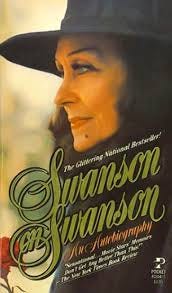Swanson on Swanson, Kennedy on Kennedy, Goodwin on Goodwin (and Hamilton)...
Coe on Coe?! Never. Okay, maybe just a little bit.

“Swanson on Swanson," actress Gloria Swanson’s memoir, burst forth like a dam breaking. It is raw, full of messy partial truths, an excess of human desire and ambition, and stands at odds with decades of polite fictions and carefully constructed public images. And it has more holes in it than Thomas Jefferson’s prized beehives.
I’m not necessarily recommending it—I had to read it, for research. In Swanson’s book, Joseph P. Kennedy, JFK’s father, a complex figure driven by appetites both carnal and financial. He’s not just a "ladies' man" in the parlance of idle gossip—it’s a fundamental aspect of his character.
And Swanson wasn’t just another conquest. She was a force in her own right, already quite successful (and partnered) by the time she met Joe Sr. (For the best biography on him, see David Nasaw’s “The Patriarch.”)
Swanson, at 80, “wrote” the memoir because, as the story goes, Rose Kennedy got there first—but that’s not quire true. The actress was surely incensed by Rose’s descriptions of “poor Gloria,” a woman her husband definitely didn’t have an affair with, but the decision to published wasn’t exactly her choice. I love the way Rachel Syme describes the “memoir-as-mythology, bravado-as-book, a feat of self-aggrandizement, that, incredibly, was first conceived without its author’s consent.” Screenwriter Brian Degas had already sold the idea to Random House and would have proceeded, with or without her.
Keep reading with a 7-day free trial
Subscribe to Study Marry Kill to keep reading this post and get 7 days of free access to the full post archives.


